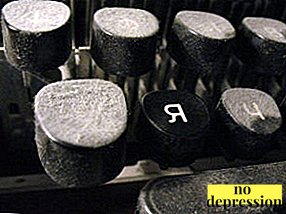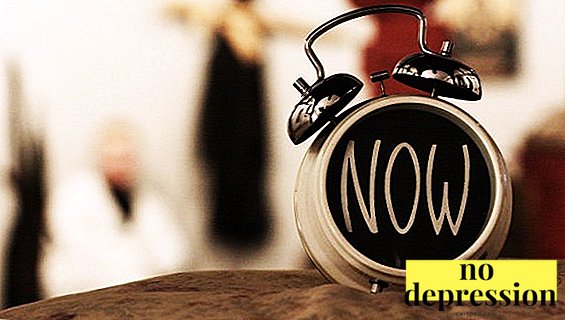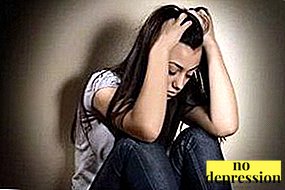Psychogenic depression is kind of mental disorderwhich can manifest itself in different forms.
In some patients, the symptoms of this ailment are closely interrelated with depressed mood and low self-esteem, in others, the opposite symptoms are observed.
Psychogenic depression is always triggered by a specific factor (a psycho-traumatic situation). The treatment of a mental disorder must begin with its first manifestations. Otherwise, there is a risk of suicidal thoughts in the patient.
General information

Psychogenic depression is categorized dysthymic disorders.
This condition is manifested as a combination of neurotic and asthenic-psychotic symptoms.
The patient may feel a gratuitous feeling of anxiety or panic, his movements become excessively active. Complications of psychogenic depression provoke disorientation in space.
The main cause of this depressive state is considered to be the impact of a strong psycho-traumatic factor.
Psychogenic depression is divided into several types:
- Isteroid form (the patient has excessively high self-esteem, criticism from the people around him causes aggression attacks, behavior is aimed at attracting attention to himself as much as possible, if thoughts of suicide arise, then suicide in most cases is indicative).
- Anxiety-melancholic form (patient's self-esteem is understated, outbreaks of aggression are replaced by a melancholy state, during periods of depressive episodes, a person can inflict bodily injuries that may not be compatible with life).
- Short and prolonged form (in the first case, the depressive state is eliminated with the exclusion of the psycho-traumatic factor for a short period of time, in the second, the depression becomes chronic and is accompanied by regular relapses).
Causes

Can provoke psychogenic depression single traumatic situation or permanent exposure on the psyche of negative external factors.
Regular stressful situations gradually break the emotional state of a person, having a destructive effect on certain parts of the brain.
The result of this process is a change in self-esteem, a distortion of the perception of the surrounding world and the manifestation of some somatic symptoms depressed.
Provoke The following factors can cause psychogenic depression:
- melancholic personality type;
- the consequences of traumatic situations;
- discrepancy between the life principles of a person and his environment;
- the consequences of situations that demean the person;
- genetic predisposition;
- regular and unreasonable criticism from people around them;
- abrupt changes in the quality of life (dismissal, retirement age, etc.);
- loss of contact with close people (death, separation, divorce, etc.);
- deterioration of the material condition and problems associated with this factor.
Symptoms and signs

The development of psychogenic depression occurs at a slower pace.
Deviations in the psycho-emotional state are combined with somatic signs.
First manifestations Depression can occur within a short time after a stressful situation or for no apparent reason.
Patients suffering from this disease are distinguished by pessimism, apathy, and indifference to the world around them.
The concomitant symptoms of psychogenic depression become melancholy, anxiety and focus only on negative events in life.
TO symptoms of psychogenic depression include the following states:
- excessive crying and depressed mood;
- tendency to sleeplessness (short and disturbing sleep);
- distraction and concentration disorder;
- deviations in mental activity;
- total inhibition of reactions;
- tendency to frequent headaches;
- sudden changes in blood pressure;
- constant internal stress;
- excessive ductility and inertia;
- excessive irritability and aggressiveness;
- weight loss due to decreased appetite;
- tendency to increased sweating.
Complications and consequences

Psychogenic depression in the absence of timely treatment can provoke the development of an endogenous form of a depressive state.
Cure such ailment will much more difficult.
In addition, depression can become chronic, and relapses will occur at short intervals.
The most dangerous consequence of this type of mental disorder is the appearance of additional mental pathologies and suicidal tendencies.
TO the number of complications of psychogenic depression include the following states:
- regular panic attacks;
- development of dysthymia;
- vegetative-vascular pathologies;
- psychogenic melancholy type;
- suicide attempt.
Diagnostics
The task of diagnosing psychogenic depression is not only to confirm that the patient has a mental disorder, but also elimination of its endogenous type (treatment methods for different types of depression are different).

In the first case, a person blames surrounding people for his problems, in the second - himself.
To determine the level of depression are used special testing methods.
As a result of their conduct, a specialist can not only reveal a specific type of depressive state, but also a stage of its development.
When diagnosing psychogenic depression most effective following techniques:
- Zang depression test;
- Hamilton scale testing;
- determining the level of depression according to Balashova;
- Beck Depression Scale;
- a blood test to determine the level of thyroid hormones;
- blood tests for vitamins of group B.
Treatment
In compiling a course of therapy for psychogenic depression, many factors are taken into account. Important role plays the degree of development of the depressed state, the individual characteristics of the patient’s psyche, his gender and age, the presence of certain somatic diseases
The main method of treating depression of this type is the use of psychotherapeutic techniques.
Medicines are prescribed if there is no tendency to recovery or if pronounced complications (for example, thoughts about suicide).
Medicines

Preparations for the treatment of psychogenic depression are selected individually for patients.
In most cases, to eliminate the depressive state apply antidepressants and tranquilizers.
These categories of drugs include many varieties, each of which has its own indications, contraindications and features of use.
Independently decide on the need for their admission is strictly prohibited.
The following are used in the treatment of psychogenic depression. types of drugs:
- sedatives;
- serotonin reuptake inhibitors;
- monoamine receptor agonists;
- monoamine oxidase inhibitors;
- selective inhibitors of reverse neuronal uptake;
- vitamin means with a pronounced therapeutic effect.
Psychological help
Psychiatric techniques have a special place in the treatment of psychogenic depression. This treatment is most effective. The treatment regimen differs depending on whether or not the patient has thoughts about suicide.

The task of a specialist is to identify provoking factors, change the attitude of a person towards them and help in finding solutions to existing problems.
To speed up the recovery of psycho-emotional state apply special medicines.
Variants of the methods used:
- Cognitive behavioral therapy (the method allows to change the scheme of thinking of the patient, in psychotherapy this method is one of the most effective means of treating depressive conditions).
- Individual sessions with a psychologist or psychotherapist (such techniques are used in the presence of certain symptoms of psychogenic depression).
- Additional methods of psychotherapy (such techniques include art therapy, gestalt therapy, zootherapy, water procedures, breathing exercises, etc.).
Almost recommendations
Maximum effectiveness in the treatment of depression has A complex approach. It is necessary not only to attend sessions appointed by a specialist and take appropriate preparations, but also to follow a number of additional recommendations.
A serious approach to the treatment of mental disorders will help reduce the risk of complications and speed up the patient’s healing process.
Additional practical recommendations:
 sufficient exposure to fresh air;
sufficient exposure to fresh air;- respect for sleep and wakefulness;
- regular and feasible exercise;
- mastering techniques of breathing exercises or yoga;
- taking herbs based on herbs with a sedative effect (lemon balm);
- strict adherence to the recommendations of the specialist;
- the exclusion of self-treatment with the established diagnosis of psychogenic depression.
Prevention and prognosis
In most cases, projections for psychogenic depression are favorable.
With adequate and timely treatment, the symptoms of the disease are completely eliminated, and the risk of recurrence becomes minimal.
Adverse prognosis is possible in the absence of treatment or in the late diagnosis of mental disorder. In this case, the disease may become chronic. After a short remission, new outbreaks of depression will occur.
The measures to prevent psychogenic depression include the following recommendations:
- Compliance with sleep and rest (exclusion of physical and mental overstrain of the body).
- Regular replenishment of vitamins (taking vitamins, adjusting the diet).
- Preventing stress on the body.
- In the presence of excessive sensitivity of the psyche, it is necessary to take drugs with a sedative effect (you should first consult with your doctor).
- If you suspect depression, you should contact a specialist as soon as possible.

Depression has a negative impact not only on the psyche, but also condition of the whole organism.
Constant emotional stress disrupts the performance of the brain, the digestive system and the heart.
Some effects of mental disorders are irreversible. If symptoms of depression appear, you should receive qualified medical assistance as soon as possible.

 sufficient exposure to fresh air;
sufficient exposure to fresh air;

